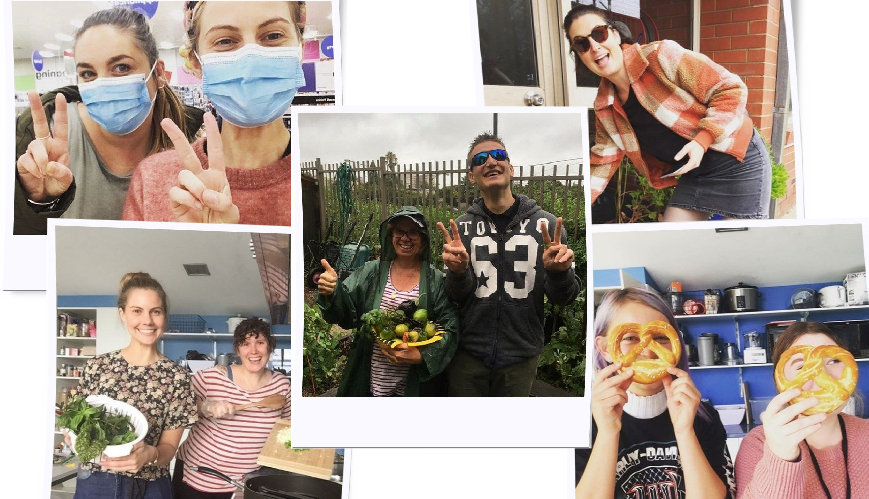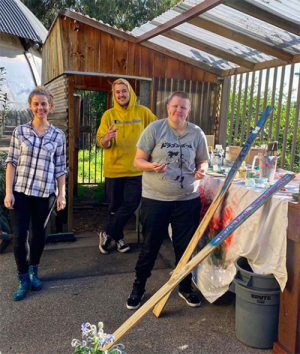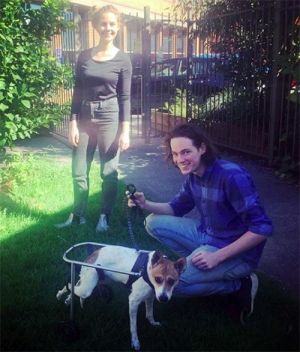Youth refuges staying positive as lockdown hits hard

Youth refuges staying positive as lockdown hits hard
3 August 2020
Young people at The Salvation Army youth refuges in Melbourne are experiencing multiple challenges due to the COVID-19 lockdown, but staff are prioritising their wellbeing and future with cooking classes, a community garden, and ‘boredom buster’ and ‘care’ packages. (Please note in cases where social distancing is not practised, people are in residence together. Some photos were taken before masks were mandatory).
Melbourne’s second COVID-19 lockdown is taking a mental and physical toll on everyone, but it has become an especially tough time for vulnerable young people in the city.
The situation is now bigger than face masks and social distancing for these young people – it’s beginning to threaten their future housing and employment opportunities, according to Claire Edmanson, who manages The Salvation Army’s two youth refuges in the city – Tranmere Street in Fitzroy and Upton Road in St Kilda.
 Members of the Upton Rd community get busy potting plants in their community garden.
Members of the Upton Rd community get busy potting plants in their community garden.
“Having been through the first lockdown, we have the benefit of knowing the challenges and the additional supports young people require,” said Claire. “But the difference this time around is that, emotionally, it’s having a bigger impact on the young people accessing our service, which mirrors the experience of the general population. This second lockdown has placed further barriers between young people and their goals of securing employment and long-term housing, which creates a lot of additional stress.”
The two centres are supporting 22 young people on-site and up to 70 off-site. Claire and her team have kept the young peoples’ welfare a priority during this challenging time, especially with many of them being forced to stay inside for longer periods.
“The first time there was not a lot of issues with young people engaging [with COVID-19 safety measures]. But people are less engaged six months in, which is reflective of the wider community,” said Claire. “There are more conversations than last time about the impacts of COVID-19 and the second lockdown on mental health. In terms of people struggling with isolation, [we find] people living off-site in community are equally as isolated [as normal] in houses or share houses. They are having the same experience we’re all having – it feels like, ‘When it is going to end?’”
Prior to COVID-19, Claire and her team relied heavily on face-to-face contact, enabling the young people to attend school, look for employment and find permanent housing. But, like all of us, they have learned to be adaptable in lockdown.
 Visits from animals (including this gorgeous dog) help residents at Tranmere Street and Upton Road keep their mental health positive during the lockdown.
Visits from animals (including this gorgeous dog) help residents at Tranmere Street and Upton Road keep their mental health positive during the lockdown.
Homework club now takes place over Zoom instead of the communal table, a weekly cooking class shows the young people how to use the fresh produce left at their doors, and ‘check-ins’ take place over the phone or by Zoom. The addition of therapy rabbit ‘Kim’, and therapy dogs, always lift the young peoples’ moods. The activities are designed to help them not only prepare for the future but cope with the uncertainty of the present.
“We are making sure that young people have a smartphone so they have video capacity, and access to the internet by purchasing data. And we are looking at what can we do on-site – providing resources for their rooms – activities, mindfulness exercises and DVD players,” said Claire. “One of the biggest challenges in lockdown for young people is education and managing schooling from home, so our Zoom homework club is where young people can bring homework and resumes.”
Deemed an essential service, these youth refuges have remained open 24/7, but social-distancing restrictions mean only a third of the rotating staff can serve at a time. Thankfully, their commitment has made the transition easier. And whether they are purchasing items to help clients beat boredom, transporting people to appointments or school [between lockdowns], or reminding residents to wear a mask, they have stayed compassionate and vigilant.
“I’ve been really proud to see the response of our staff,” said Claire. “There is, of course, a constant risk of COVID-19 within residential services, but we’ve had nothing but positive feedback and commitment from staff. We just have really tried to make sure whenever possible that young people remain the focus of the work we do.”
The teams at Tranmere Street and Upton Road continue to take life one day at a time. The future is full of uncertainty for the youth they connect with, but they are committed to supporting them for the long haul. So when COVID-19 restrictions lift, each of them will have the hope and future they deserve.
“At the moment we are in six weeks of lockdown, and we’re not planning beyond that,” said Claire. “We’ve got to just focus on what the current circumstances are and what we can do within them. Every young person is different.”